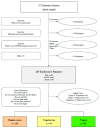Training Behaviors and Periodization Outline of Omnivorous, Vegetarian, and Vegan Recreational Runners (Part A)-Results from the NURMI Study (Step 2)
- PMID: 37049635
- PMCID: PMC10096545
- DOI: 10.3390/nu15071796
Training Behaviors and Periodization Outline of Omnivorous, Vegetarian, and Vegan Recreational Runners (Part A)-Results from the NURMI Study (Step 2)
Abstract
Runners train for long-distance competitions based on underlying motivations, which may be similar to individual dietary motivations (e.g., well-being and performance). Fundamental training differences may arise in recreational runners following different diet types (omnivore, vegetarian, vegan) considering possible motive variations. Following a cross-sectional design, distance runners completed a survey (online), including a thorough assessment of training behaviors with generic training details and periodization specifics in three phases: 1. an intermediary and rebound stage, 2. a main preparatory stage, and 3. a main event stage (tapering or interim event level/s). Kruskal-Wallis and chi-squared tests were used in the statistical analysis. A total of 245 fit recreational runners following omnivore (n = 109), vegetarian (n = 45), and vegan diets (n = 91) were included. Significant differences in the initial running motivation were found across dietary subgroups (p = 0.033) as well as for current motivations (p = 0.038), with vegetarians being the least health motivated (27% and 9%, respectively). No differences in each of the specific periods were found between diet types across the outline (p > 0.05). The present evidence shows that there is a lack of fundamental training differences based on recreational runners following different generic types of diets. The results of the present investigation may be especially relevant for future studies on safety, sustainability, and performance-enhancing dietary practices among athletes.
Keywords: half marathon; marathon; periodization; plant-based; race; recreational athlete; running; training.
Conflict of interest statement
The authors declare no conflict of interest.
Figures






Similar articles
-
Dietary Habits and Race Day Strategies among Flexitarian, Vegetarian, and Vegan Recreational Endurance Runners: A Cross-Sectional Investigation from The NURMI Study (Step 2).Nutrients. 2024 May 27;16(11):1647. doi: 10.3390/nu16111647. Nutrients. 2024. PMID: 38892580 Free PMC article.
-
Racing Experiences of Recreational Distance Runners following Omnivorous, Vegetarian, and Vegan Diets (Part B)-Results from the NURMI Study (Step 2).Nutrients. 2023 May 9;15(10):2243. doi: 10.3390/nu15102243. Nutrients. 2023. PMID: 37242128 Free PMC article.
-
Training and Racing Behaviors of Omnivorous, Vegetarian, and Vegan Endurance Runners-Results from the NURMI Study (Step 1).Nutrients. 2021 Oct 7;13(10):3521. doi: 10.3390/nu13103521. Nutrients. 2021. PMID: 34684522 Free PMC article.
-
Calcium intake in vegan and vegetarian diets: A systematic review and Meta-analysis.Crit Rev Food Sci Nutr. 2023;63(31):10659-10677. doi: 10.1080/10408398.2022.2084027. Epub 2022 Jun 6. Crit Rev Food Sci Nutr. 2023. PMID: 38054787
-
Fracture Risk in Vegetarians and Vegans: the Role of Diet and Metabolic Factors.Curr Osteoporos Rep. 2022 Dec;20(6):442-452. doi: 10.1007/s11914-022-00754-7. Epub 2022 Sep 21. Curr Osteoporos Rep. 2022. PMID: 36129610 Review.
Cited by
-
Dietary Habits and Race Day Strategies among Flexitarian, Vegetarian, and Vegan Recreational Endurance Runners: A Cross-Sectional Investigation from The NURMI Study (Step 2).Nutrients. 2024 May 27;16(11):1647. doi: 10.3390/nu16111647. Nutrients. 2024. PMID: 38892580 Free PMC article.
-
Racing Experiences of Recreational Distance Runners following Omnivorous, Vegetarian, and Vegan Diets (Part B)-Results from the NURMI Study (Step 2).Nutrients. 2023 May 9;15(10):2243. doi: 10.3390/nu15102243. Nutrients. 2023. PMID: 37242128 Free PMC article.
References
-
- Bangsbo J., Blackwell J., Boraxbekk C.-J., Caserotti P., Dela F., Evans A., Jespersen A.P., Gliemann L., Kramer A., Lundbye-Jensen J., et al. Copenhagen Consensus statement 2019: Physical activity and ageing. Br. J. Sports Med. 2019;53:856–858. doi: 10.1136/bjsports-2018-100451. - DOI - PMC - PubMed
-
- Carmack M.A., Martens R. Measuring commitment to running: A survey of runners’ attitudes and mental states. J. Sport Exerc. Psychol. 1979;1:25–42. doi: 10.1123/jsp.1.1.25. - DOI
MeSH terms
LinkOut - more resources
Full Text Sources

